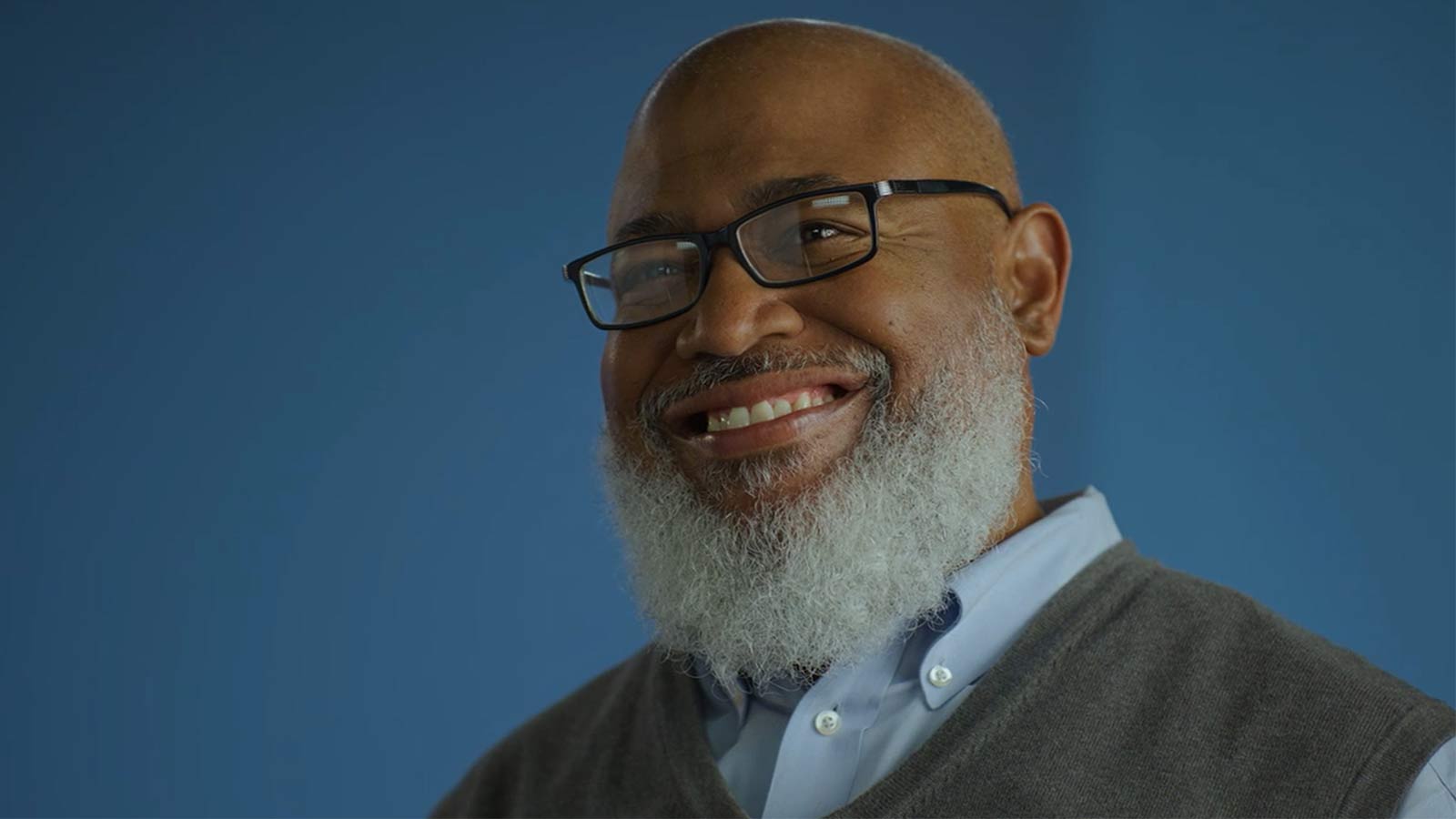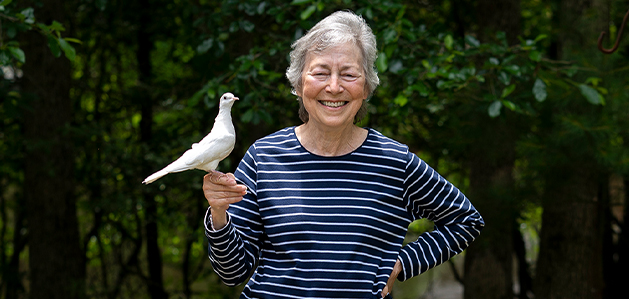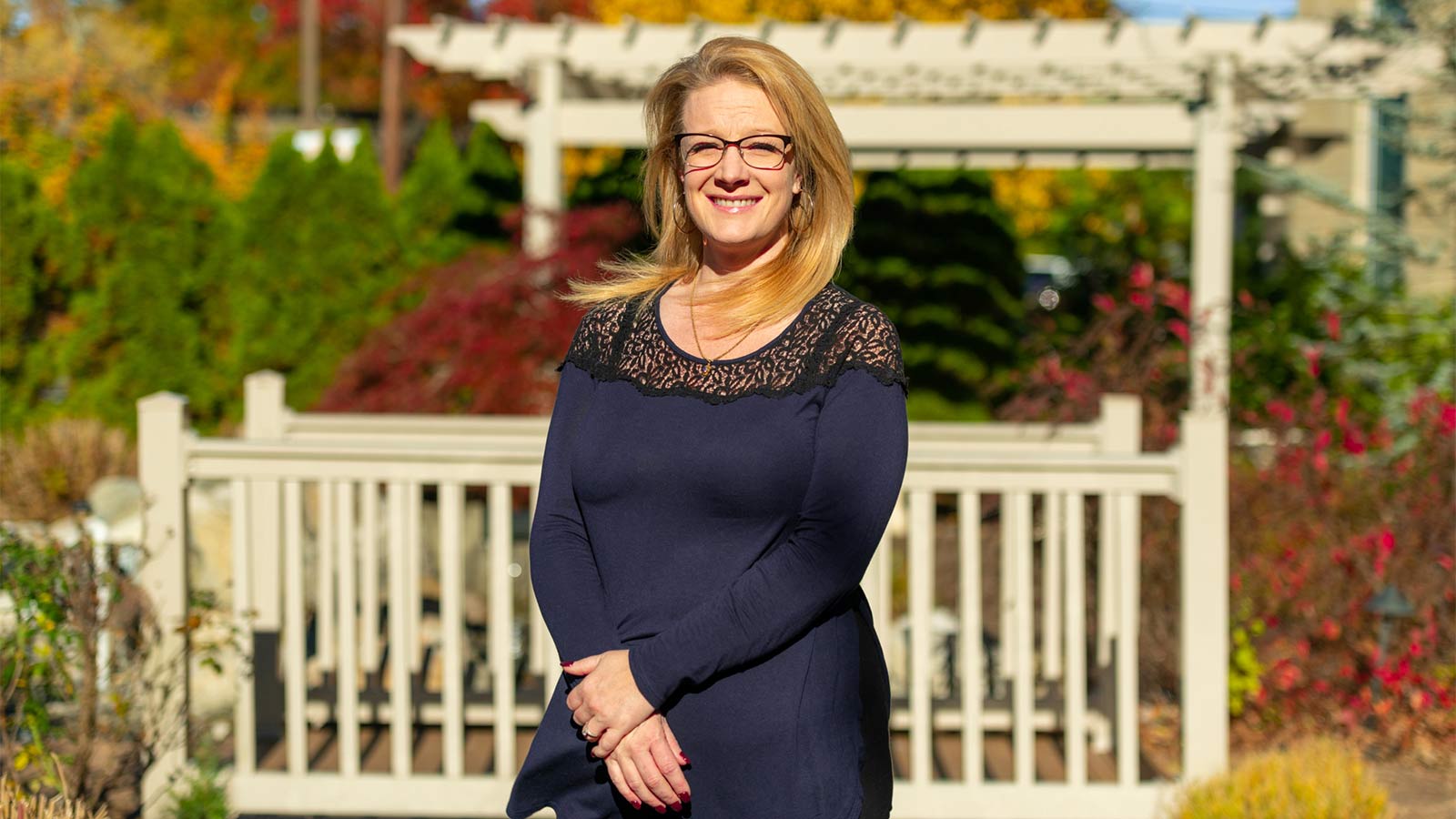Breast Cancer Diagnosis Inspires Catherine to Help Others
The Penn Medicine | Virtua Health Cancer Program provided complete treatment to help Catherine overcome breast cancer—and inspired her to assist others going through the journey.
A cancer diagnosis often is the least-expected news you’ll ever receive. At age 38, it certainly wasn’t on Catherine Thompson’s mind. But once you know you have cancer, it’s what you do next on your journey that can make all the difference in overcoming it.
Acting Quickly After Finding a Breast Lump
Catherine’s journey started when she felt a lump in her breast, which she knew wasn’t normal for her. She saw her gynecologist the next day to have it evaluated, and her doctor referred her to Virtua breast surgeon Lori Timmerman, DO, for further evaluation and a biopsy.
A week later, she received earth-shattering news—she had breast cancer. Through further diagnostic testing and imaging, she learned it was stage 3B. This means that cancer was found beyond her breast, but it hadn’t spread (metastasized) further. The tumor was also HER2-positive/hormone-negative, which are specific tumor characteristics that help stage your cancer and guide treatment.
After overcoming the shock of her diagnosis, Catherine went into survivor mode. As a single mom, it was tough to explain to her then-10-year-old daughter that she was sick. She explained simply that she was going through changes, without providing too many details that could scare her. Catherine focused on keeping life normal for her, making sure to schedule fun activities.
“I was determined to make it to the other side of it,” said Catherine, a software engineer from Gloucester County. “I held onto my faith and surrounded myself with loved ones who could help me get through it.”
All the Breast Health Care She Needed
The Penn Medicine | Virtua Health Cancer Program offered all the expertise and high-level treatment that Catherine needed—and all in South Jersey. She required a multipronged treatment approach that included chemotherapy, surgery, breast reconstruction, radiation, and targeted therapy. This thorough, multidisciplinary approach helps eradicate cancer and prevent it from returning in the future.
Coordinating all those services was a little easier on Catherine with the help and support of her breast cancer nurse navigator, Maria Minardi. “She organized my care plan and set up all of my necessary appointments,” said Catherine.
Many Stops on Her Breast Cancer Journey
Catherine’s treatment plan started with six rounds of chemotherapy. She was always surrounded with support during her infusions, accompanied by her then-fiancée, twin sister, or future mother-in-law. But she also felt tremendous support from the chemotherapy team, which shared advice on the importance of staying hydrated to minimize side effects and supplied her with ice packs for her hands and feet to prevent nerve damage.
Catherine began losing her hair after the second round of chemotherapy, so she shaved her head. It took time for her and her daughter to adjust to this loss, but Catherine made the best of it by experimenting with various wigs and learning to style headwraps from YouTube tutorials.
Soon after completing chemotherapy, she had a double mastectomy, removing both breasts.
“When it comes to breast cancer surgery, I make sure women know they have options,” said Dr. Timmerman. “I give patients all the best potential choices and talk it through with them, but I want them to confidently decide what’s best for them.
Dr. Timmerman performed the mastectomy, which was immediately followed by breast reconstruction surgery with Penn Medicine | Virtua Health microvascular and plastic surgeons. “I chose to have breast reconstruction using the DIEP flap procedure and implants,” Catherine said.
The DIEP flap procedure uses skin, fat, and blood vessels from deep in the abdomen to recreate the breast shape. It can be used with implants to meet a woman’s unique needs.
“On the bright side, I ended up with a flatter stomach due to the DIEP flap surgery, and now I love how my clothes fit,” she said.
She also opted to have nipple reconstruction, which helps give the breast a more natural look after a mastectomy.
While she was recovering from surgery, Catherine started the next step of her treatment—25 rounds of radiation therapy with radiation oncologist Catherine Kim, MD.
“Everyone there was wonderful and supportive,” she said. “The best part was ringing the bell to mark the end of my radiation treatment and celebrating with the team.”
Completing the Last Step of Cancer Treatment
The final leg of Catherine’s breast cancer treatment journey included a targeted therapy infusion of Herceptin every few weeks. Herceptin is an antibody drug that targets HER2-positive cancer cells, working to slow or stop their growth. Treatment with chemotherapy and Herceptin can minimize the risk of cancer returning, compared to chemotherapy treatment alone.
Through all the steps on her now-complete cancer treatment journey, Catherine credits her ability to stay positive to the loved ones who helped her laugh and the connection she felt in online breast cancer support groups.
“I felt way too blessed to be stressed,” she said. “I prioritized protecting my peace and held tight to my family and friends who did, too.”
Making Your Mess Your Message
Catherine has become an inspiration to other people experiencing cancer. After she shaved her head and completed chemotherapy, her hair started to come back in a completely different texture than before her treatment.
After many Google searches, she learned that “chemo curls” can happen after chemotherapy. The chemotherapy drugs destroy cancer cells, but also can affect healthy ones, like hair follicle cells. While this is often temporary, it can be months or years for a person’s former hair texture to return.
Catherine’s experience with these curls inspired her to start ChemoCurls.com, a line of nourishing hair products, gentle styling tools, and other accessories she created to help people style their new curls. Her main goal is to help individuals undergoing chemotherapy maintain their beauty and confidence while protecting and celebrating their hair through this journey.
With the advice of making her mess her message, Catherine said, “It was inspiring for me to share my experience and create something positive to help other people going through treatment.”
Focusing on You, So You Can Get Better
You don’t have to face breast cancer alone. The Penn Medicine | Virtua Health Cancer Program offers every available treatment option. Learn more and schedule an appointment.
There's So Much More to Explore
Discover expert insights, inspiring stories, health tips, and more by exploring the content below!

What to Expect From a Robotic Hysterectomy

When You Need A Hysterectomy Know Your Options

10 Reasons To Schedule Your Colonoscopy Today

Take Control of Incontinence, Prolapse, and Other Pelvic Floor Disorders

How Can I Prevent Bone Loss and Osteoporosis?
Is an At-Home Colon Cancer Test a Good Alternative to a Colonoscopy?

How Do You Manage the Side Effects of Weight-Loss Medications?
A Woman’s Four-Step Guide to Fight Back on Back Pain

What You Need To Know About Carpal Tunnel Syndrome

The Truth About Menopause, Weight Gain, and Belly Fat

Shedding Light on Lesser-Known Menopause Symptoms and Solutions

Debunking The Myths About Vaginal Dryness
Inside Look at Blood Vessels Aids PAD Treatment
Denise Davis: Pay Attention to Your Heart Health

What You Need To Know About Stroke Treatment

Prayers Answered: Pastor Gatling on New Mission After Kidney Transplant

10 Smart Ways to Manage Your Diabetes

Signs You May Have Chronic Kidney Disease

5 Essential Winter Foot Care Tips When You Have Diabetes

Sweet Music: Trust, Teamwork Save Justin from Heart Attack

Advanced Minimally Invasive GYN Surgery Puts You at the Center of Care

Complex Heart Surgery Nets James a Lifelong Friend

Hepatitis C Kidney Transplant a Blessing For Lee Manns
Special Delivery Organ Transplant Gives Amazon Employee Second Chance

7 Reasons Why You Want Your Surgeon to Be an Expert in Robotics

Colitis Symptoms Under Control, Jennifer Is ‘Living My Best Life’

How Do I Care for a Wound that Won't Heal?

Be Fast and Spot the Signs of Stroke

Surprising Symptoms May Signal Stroke In Women

Five Back Pain Risk Factors That You Should Know

Is My Back Pain Normal, or Is It Spinal Stenosis?

Robotic Hernia Surgery Combines Innovative Techniques With Faster Recovery Times

The HPV Vaccine: A Powerful Shield Against Cervical Cancer

How Does Breast Density Affect Your Mammogram?

Menopause: New Insights Into the Power of Hormone Replacement Therapy

How to Prevent and Treat Urinary Tract Infections
Signs You Should Get Treated For Vein Problems

One New Heart Valve Saves Two Lives in the Tritten Family
What You Need to Know About Heart Failure
Lung Valve Surgery Relieves COPD, Emphysema Symptoms

Lung Screening, Robotic Technologies Get Pat Kicking Up Her Boots Again

Breast Cancer Diagnosis Inspires Catherine to Help Others

Jasmine’s On-Air and Pain-Free After Gallbladder Surgery

When Should I See a Doctor About My Knee Pain?

Quick Action Leads to Jesse's Recovery From Stroke

A Non-Athlete’s Guide to Shoulder Overuse Injuries
Shoulder problems aren’t limited to athletes. Virtua orthopedic surgeon Sean McMillan, DO, explains shoulder overuse injuries and prevention in this article.

A Non-Athlete’s Guide to Shoulder Overuse Injuries

Wide-Awake Hand Surgery Speeds Recovery, Puts Control in Patients' Hands

South Jersey Veteran Thrives After Cross-Country Kidney Donation

3 Ways to Avoid Knee Pain

When Should I See a Doctor for My Hip Pain?

When Should I See a Doctor About My Shoulder Pain?

Is My Back Pain Normal, or Is It Sciatica?

Is My Back Pain Normal, or Is It a Herniated Disk?

When Is It Back Pain, and When Is It Something More?

Watchman Heart Device: a Technological Breakthrough for Blood Clot Prevention

Albert's Emergency Cardiac Surgery Is a 'Story of a Lifetime'

What Can I Do Right Now About My Aching Back?

How Do I Get Rid of This Back Pain for Good?

How the Unique Stages of a Womans Heart Affect Her Health

Can Your Gut Health Affect Your Heart?

When Should I Be Worried About My Neck Pain?
Advanced Heart Failure Therapies Get Bernadine Back to Full Speed

Sarah Wins Back Her Health After Crohn's Disease Diagnosis

Put Your Mammogram Appointment on the Top of Your To-Do List

Overcoming Addiction, Philip Now Sees More Positive Side to Life
Firefighter's Successful Lung Cancer Care at Virtua
A Lung Screening Put Teresa Back in the Race

A Breast Self-Exam Saved Kristen's Life

How Sex Keeps You Healthy as You Age

Protect Your Child From HPV and Related Cancers

Why IUDs Might Be The Most Effective Birth Control

5 Things You're Too Embarrassed to Tell Your OBGYN

4 Not-So-Crazy Questions to Ask Your Doctor

Early Treatment is Best to Relieve Hemorrhoid Symptoms

The Top 10 Foods For A Healthy Diabetes Diet

What to Know About Cervical Cancer Screenings

Keeping the Beat: Advanced Heart Surgery for Aortic Aneurysm
6 Tips for an Easier Colonoscopy Prep

Are You At Risk For Chronic Kidney Disease

Rectal Cancer Surgery Gets Eileen Back to her Magical Life | Virtua Health
Robotic Surgery Helps Shelly Haney Return to Her Happy Place

New Technology Precisely Marks Suspicious Breast Lumps Before Biopsy to Ease Patient Anxiety
3 Changes You Can Make Today to Lower Your Cancer Risk

Local Pastor Makes Kidney Health Mission of Ministry
Master 3 Mens Health Issues
Personalized Breast Cancer Treatment Puts Choice In Womens Hands
Radiosurgery Delivers Targeted Treatment for Brain Tumors
Seeing a Social Worker at the Hospital
Start Reducing Your Cancer Risk Today
What’s the Difference Between Type 1 and Type 2 Diabetes?

Is This the Right Time in Your Life for Bariatric Surgery?
Call Your OBGYN if You're Bleeding After Menopause
Know Your Endometrial Cancer Treatment Options
Robot Helps Spot Lung Cancer Early
6 Healthy Habits to Start in Your 20s for Better Lifelong Health
Restoring Appearance and Spirit After Breast Cancer
4 Essential Cancer Screenings
How to Overcome Colonoscopy Fears
What You Need To Know About Cancer And COVID 19 Risks
Prostate Cancer Screening: What You Need to Know
Military Veteran Pam Carpino Offers Hope to Women With Triple Negative Breast Cancer
Reclaim Your Strength and Spirit After Breast Cancer
The Cardio Oncology Team Protects Your Heart During Cancer Treatment
Coping with Body Changes After Breast Cancer Treatment
How Doctors Determination and Dancing Helped Judy Stokes Through Breast Cancer Treatment
How Is Breast Cancer Diagnosed?

All for Bear: Dan Loses Weight to Be His Son’s Kidney Donor

‘Astronomical Changes’: Brain Stimulation Therapy Lifts Ashley’s Depression

Augmented-Reality Surgery Has Bobby Back on Stage, Rocking His New Hip

Hyperbaric Wound Therapy Puts Joette Back in Motion

Robotic Hernia Repair Renews David's Active Lifestyle

